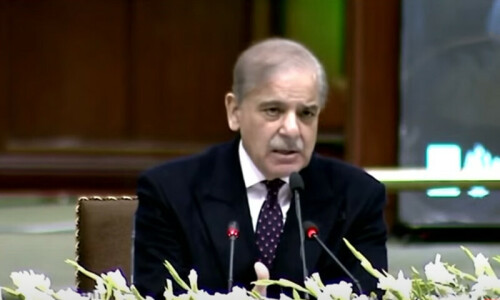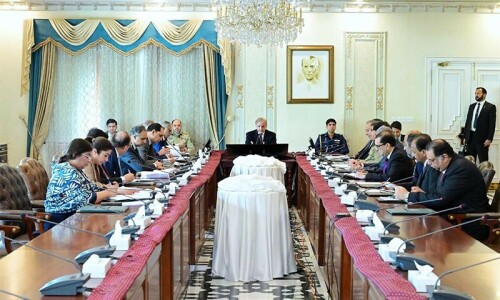DESPITE an overarching legal framework that aims to encourage female participation in the workforce, Pakistani women’s entry in some sectors continues to be hampered by decadent regulations that have been carried forward from the era of the British Raj.
At a recent seminar, during the question-answer session, I learned something that astonished me. Women, said the lady asking the question, were not allowed to enter shipping ports. She put forth the question “to which authority does one turns to, to try to change this?”
While on further investigation I found that this clause which had indeed existed, was no longer considered valid; according to Sadia Khan, an entrepreneur with ties to the shipping business, it had been in place when she returned to Pakistan to join the family business, although “I believe this clause may have been overturned since port passes are now being issued to women and my experience is of around 12 years ago.”
The example highlights an important, but hardly ever mentioned, impediment to women’s integration into the workforce: while Pakistan may have a legal framework that aims to encourage a woman’s entry into the labour force, one is bound to come across outdated policies that are still being selectively enforced.
While Pakistan may have a legal framework that aims to encourage a woman’s entry into the labour force, one is bound to come across outdated policies that are still being selectively enforced
The seminar, titled ‘Driving Economic Growth through Women’s Employment in Pakistan’, was held last week and was organised by the Centre of Excellence in Responsible Business in collaboration with the International Finance Corporation, a member of the World Bank Group.
Speaking on the occasion, Dr Shamshad Akhtar, a former governor of the State Bank of Pakistan, said the devolution process has empowered provinces, but at the same time has further complicated women’s integration into the workforce.
“Pakistan has a basic legal framework, but it’s very fragmented. The 18th Constitutional Amendment, which very effectively empowered provinces in my view, has actually also fragmented the application (of laws governing women empowerment).
“Of course it also lays the foundation for a progressive province to take the destiny of its women in its own hands, but I think we would like to see a more united front for women,” she said. “You really need conformity in national laws as it is very difficult to comprehend the legal framework for those women who may not be astute in terms of its understanding.”
Dr Akhtar said not only was it difficult for educated women to comprehend some of these laws, a few rules could also be quite outdated. This means most Pakistani women will never be aware of their labour rights, considering the country’s female literacy rate is 48 per cent compared to 70pc among males.
In the global push towards combating the disparity between men and women in the workforce, Pakistan jumped onto the bandwagon some time back.
Yet, according to figures quoted in the World Bank’s Women, Business and Law 2016 report, only around 26pc of Pakistan’s females participate in the labour force, while the country ranks second last (143 out of 144) in the World Economic Forum’s Global Gender Gap Report 2017 in both the overall ranking and the economic participation and opportunity sub-index.
Tazeen Hasan, a senior private sector development specialist with the World Bank’s Women, Business and Law programme, told the participants she was optimistic about the speed of legal reforms.
Over the last two years, 65 economies have made 94 legal reforms. In another study, it was found that more than 50pc of the discriminatory laws that were in the books in 1960 had been reduced by over a half by 2010. However, she said there is a need to continue this momentum by setting up systems whereby discriminatory laws already in place can be reported and repealed.
Dr Akhtar said that Pakistan falls behind when we try to evaluate where the country stands relating to quotas or the enforcement of the legal framework.
The problem, Salman Sufi pointed out, was in the difficulty of implementing regulations. Mr Sufi is the Director General Strategic Reforms Unit, Punjab, where apart from legislation they are also trying to create implementation mechanisms.
“We have some very good laws in Pakistan, but when it comes to on-ground implementation, we usually only talk about these things in seminars. If we’re going to come up with a law how will we implement it? Are we going to use departments that are already over burdened with so many other tasks and give them another law to implement or should we come up with its own implementation mechanism?”
However, be it the lack of a mechanism to repeal draconian laws or the difficulty in implementing those that focus on gender equality, the fact remains that the gap between women’s economic participation and the economic opportunities available to them continues to grow compared to global standards.
Whether these gaps are societal or regulatory, “the challenge is to make the workplace a place where women are respected”, United Bank Ltd CEO Sima Kamil said. “I think that’s what’s most important. A woman should feel safe, respected, welcomed and valued and that if you do that a lot of the challenges slowly disappear.”
Published in Dawn, The Business and Finance Weekly, March 19th, 2018














































